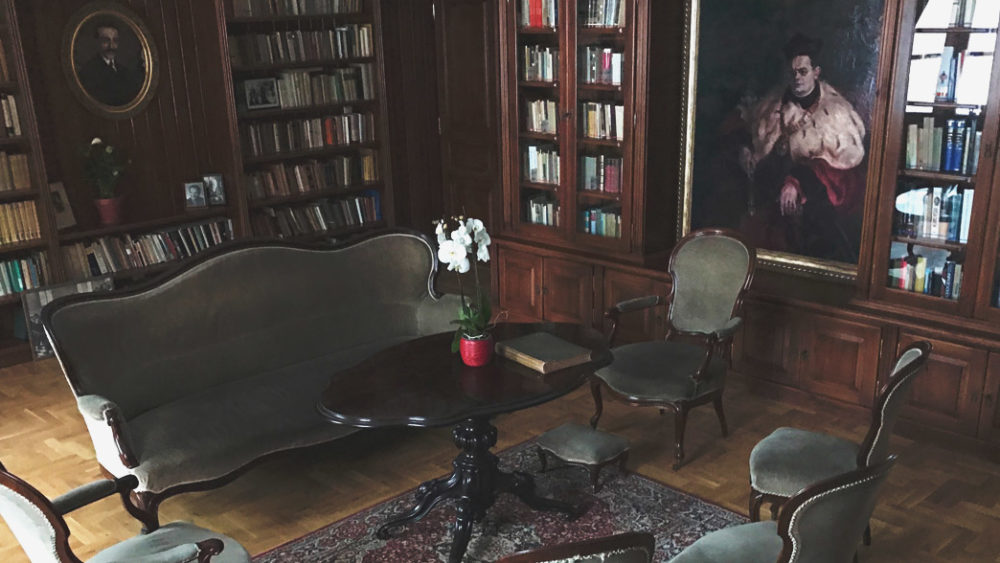They resist the temptation of demanding more from me than I can offer. I presume because they know me well enough to know the answer will confuse more than explain as I find it very difficult to express my ideas within a modern, 21st Century framework. So they smile sweetly over the phone when I tell them about my intention to build an educational centre. They struggle to respond with the most tedious of questions, asking if there is a market for such a place. I don’t know if there’s a market for a residential centre teaching Slavic Yiddish, Jewish Literature, Christian Mysticism, Arianism and Holocaust Poetry in the middle of nowhere. The nearest Jewish population is a two hour drive from here in Krakow and even that community is thin on the ground. Certainly among scholars the interest in ancient Christian texts flourishes, but has that interest found its way to the more accessible regions of the laity?
Not all projects are approached from a logical, rational perspective complete with business plan, pots of money, and overwhelming approval from family and friends. Some projects are envisioned by one or two people all alone in the woods perhaps walking amongst the trees communing with their ancestors. At least that’s what it feels like when I consider that my husband, Paul, who has just returned from town bearing supplies to relate a conversation he had with a local vendor. ”Happy New Year,” he greets. ”We’ll see,” responds the unenthusiastic clerk. ”Why? What are you anticipating?” ”So far we’re all right because we haven’t allowed refugees into the country.” ”What’s wrong with refugees?” ”Their religion is different from ours.”
Yesterday, coming home from a delightful stroll along the country roads, we encountered a lovely young couple in front of the house with their toddler running and jumping into the neatly raked piles of leaves. They told us they were living in Belgium now but worried about the Muslims.
Fear is the dominating impulse behind what we’re thinking these days. There be dragons! And indeed there be, but my sense is more from the inside than the outside. I can’t help but wonder if a Muslim couple moved in next door if rather than run and hide from them if one were to knock on the door and welcome them with breads and cakes. What if we befriended our neighbors?
Some might argue in Utopia this would be the way of life but not in the dangerous world in which we live. Actually, the world has always been dangerous but should that stop us from being kind? Should it stop us from learning? Should we allow the unconsciousness of the many, swayed by popular culture, convinced of their own moral authority, to leverage force over the rest of us who proclaim the emperor has no clothes.
I am here in Poland because I have been offered guardianship to a family property whose beginnings were seeded during the French Revolution. It would be so easy to profit by it, turning it into an event space for weddings and a cheap hotel for those who have no regard for the history of the building. Dead easy. But the less traveled road, the difficult one, is to keep an ear open to the ancestors who tended the gardens, painted spring flowers on canvas, wrote poetry, and listened to a Chopin nocturne. To breathe life again into what was once held sacred is what the soul of the building demands. It requires of us to return to the place where we took a wrong step and to put it right again.
According the United States Holocaust Memorial Museum, the Jewish communities of Eastern Europe were devastated. In 1933, Poland had the largest Jewish population in Europe, numbering over three million. By 1950, the Jewish population of Poland was reduced to about 45,000.
Not only were Jews the scapegoat for a world gone mad but so were the Polish intelligentsia, academics and land owners. This was the family I married into and the family that lost their land, their possessions, their nationality and their mental health in some cases. Nothing was ever the same for anyone after the war.
We got it wrong. We murdered people because of their religion, their lifestyle and their looks. We labeled them, ”The Other” just like we’re doing today with perfectly innocent Muslims who settle in our neighborhoods looking for refuge from the same kind of terror that we ourselves would fear and run.
We keep getting it wrong. We keep criminalising whole communities of people who pray differently from the way we pray, whose rituals don’t resemble ours, whose celebrations occur on different days of the month from ours but is this a reason to instate a sanitizing moral code to cleanse them from our midst?
Who will we accuse when all that doesn’t look like us is removed and still there remains danger and violence, unrest and hatred? Who will the finger point to then? The fact of the matter is, we will have only ourselves to blame.
So, yes, I would like an educational centre to emerge from the soul of the building at Sichow so we can reclaim what was lost over sixty years ago. Am I afraid? Yes, but not for my life as much as for the fact that I will be exposed, vulnerable and ridiculed. Surely, a small price to pay in the hopes that education will contribute to making a difference in a world that needs this more than money, power, property, fame or status is the need for heart, tolerance and compassion.


Comments are closed.